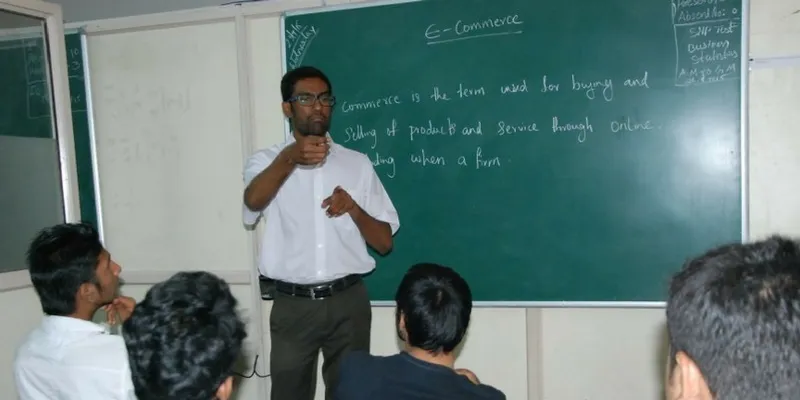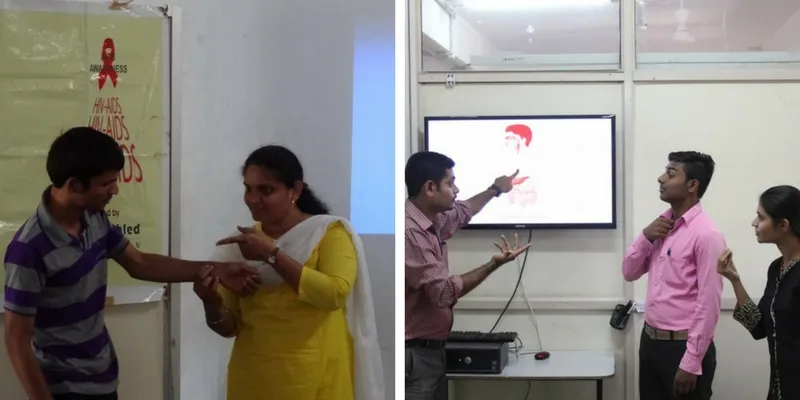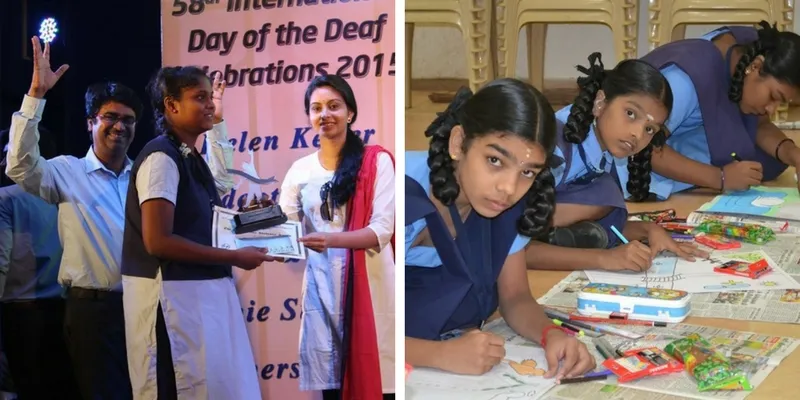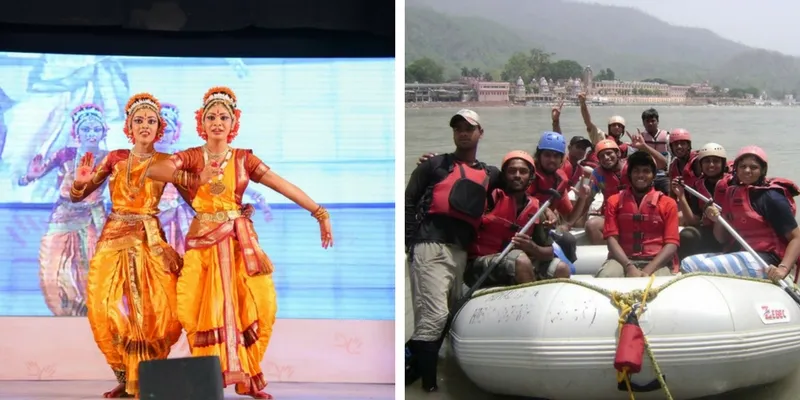Over 5,000 deaf have found employment, independence, and respect; thanks to this NGO
‘Walk into the office and you will see every position held by a deaf person.’ As a non-profit organisation that provides free vocational training, the Deaf Enabled Foundation may be the quietest office but their impact has been deafeningly loud.

Bharghavi Ballurkar, a 20-year-old girl from Maharashtra, faced her share of rejection when she began applying for jobs soon after completing her degree. Being the only deaf girl in her family, she had grown inwardly into her quiet world and remained reserved from the chaotic world outside. “I used to be helpless and had no confidence in my worth,” she says, as one company after the other rejected her due to her hearing impairment, and her inability to manoeuvre herself in a predominantly ‘enabled’ world.
Vijay Boina from Andhra Pradesh has a similar story. Having discontinued his studies to support his father’s business, he suddenly found himself among customers with whom he had no way of communicating.
Bharghavi and Vijay are just two people of the five million hearing impaired in India who face challenges in communication and employment. Most of these individuals have no resources to get hands-on training with regard to both, thereby making them ill-equipped to get by in a competitive world. Moreover, the serious lack of awareness among the larger population regarding the challenges faced by the deaf only widens the gap between the hearing enabled and impaired.
It is to bridge this chasm that, in 2009, a group of individuals came together to create the Deaf Enabled Foundation (DEF), an organisation by the deaf, of the deaf, and for the deaf. DEF provides vocational training free of cost to the deaf among other courses ensuring that support and education can reach even the most marginalised sections of the community.

When it was time to empower
Ramya Miryala, Vice President, DEF, was born as the only hearing enabled person in a family of the deaf. “I have seen my parents and sister struggle to communicate with the society and even with our relatives,” she says, recalling how she learnt early on the interpretation of the ways of the deaf. “Communication is the most important thing in our lives,” and Ramya realised how the deaf are falling short when she became her family’s sole interpreter to a world ‘disabled’ to understand.
Ramya’s sister used to take her along to her Sunday classes and it was here that she met Sandeep and Hari Hara Kumar. At the time, they were all involved with other organisations for the deaf, and together they realised that a training programme for the deaf was of extreme importance. “It is only through education that we can change a system,” are the wise words of this 30-year-old; and thus DEF was born with the sole intention to enable the deaf in realising their potential, and utilising their education.

‘We are bringing the silent and the hearing world together.’
Although the organisation is to uplift the deaf, the core team realises that this won’t be possible unless it is inclusive of the ‘hearing world’. Through CSR programmes, they conduct sign-language classes so the hearing enabled can be more inclusive of the deaf. Through the years, Ramya has come across many misconceptions that people harbour about the deaf. “Many believe that sign language is universal or that it is like a mime. Some even think that deaf people cannot drive,” she reveals.
Although DEF conducts rallies to spread awareness, they go a step ahead by creating active participation by the hearing enabled. They have tie-ups with non-special universities such as the Annamalai University so that the vast number of helpless deaf students who would receive no help in their studies otherwise, have a chance to excel. She says, “It is very rare that lecturers have a good rapport with their deaf students. So we meet with the directors of these universities and explain to them the difficult situation of the students. With their study materials, we take over the training at DEF.”
They also have tie-ups with corporates to ease the hiring process for the deaf. “It’s not about creating sympathy, but it’s part of their business development,” she explains quickly as she’s used to clearing misconceptions before they arise. “Every candidate will still have to prove their worth, like anybody else.”
Let’s not forget the deaf
DEF was planted first in Hyderabad, Chennai, and Vijayawada but now has its roots branched into six other centres in Thanjavur, Visakhapatnam, Puducherry, Trichy, Mumbai, and Indore. This organisation has competent deaf instructors teaching the youth foundation skills such as English, MS-Office, speed typing, and soft skills. They also have 3D animation and multimedia courses, the first of its kind for the deaf in India.
Another aspect DEF considers essential to cover is advocacy training which includes human rights for the deaf, and the disseminating of information on related laws and rights set up by the government and the UN. This training also addresses the empowerment of women as their rights tend to be further abused.

“Sharing information that will give them the confidence to stand up for their rights is a very important area of work. DEF has been creating awareness among deaf women and training deaf women leaders who can lead other women to take their place in society.” Information and awareness on sexual harassment, domestic violence, and other gender-related issues are tapped into.
Apart from this, DEF also conducts leadership programmes, health interventions, and awareness programmes on HIV prevention, courses and creativity melas for children, theatre, and adventure camps to uplift spirits.
A loud impact
DEF has in their trail more than 1,800 deaf students who have been placed in companies or are self-employed, and close to 3,000 who have a renewed sense of confidence through their vocational training. DEF has also reached over 2,000 children and has acknowledged their talent and perseverance through recognition awards. This kind of impact, however, doesn’t come without having surpassed a few obstacles. Ramya explains,
To begin with, there is no common sign language as each state has its own sign language according to their vernacular. Adding to that is the imbalance in the levels of education among the deaf so most adult deaf persons are not educated and therefore cannot read, write, communicate, and understand the Indian sign language.

The biggest obstacle in trying to reach more deaf people, according to Ramya, is the “lack of dependable information about the number of deaf persons living in the outskirts or remote areas. So it’s difficult to locate them and pass on information about upcoming activities that could benefit them.”
Providing free training also comes with its own set of scary challenges. To ease this, they have partnered with a few institutions like Tech Mahindra, which conducts the Tech Mahindra Smart programme for the deaf. The organisation, however, also needs to cover staff income along with training expenditure. So that they’re not solely dependent on their sponsors, DEF also crowdsources funds.
Their efforts have intensified many silent voices as many go through DEF courses to discover a new life of surety and independence.







